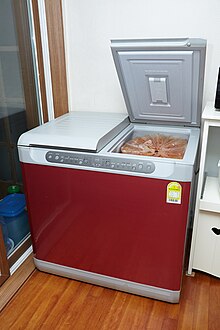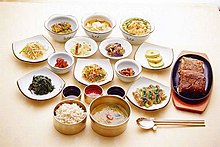Kimchi refrigerator
This article has multiple issues. Please help improve it or discuss these issues on the talk page. (Learn how and when to remove these messages)
|
| Kimchi refrigerator | |
 | |
| Korean name | |
|---|---|
| Hangul | 김치냉장고 |
| Hanja | 김치冷藏庫 |
| Revised Romanization | gimchi naengjanggo |
| McCune–Reischauer | kimch'i naengjanggo |
| This article is part of a series on |
| Korean cuisine 한국 요리 조선 료리 |
|---|
 |
A kimchi refrigerator is a refrigerator designed specifically to meet the storage requirements of kimchi and facilitate different fermentation processes. The kimchi refrigerator aims to be colder, with more consistent temperature, more humidity, and less moving air than a conventional refrigerator, providing the ideal environment for fermentation of kimchi. Some models may include features such as a UV sterilizer.[1]
In a consumer survey aimed at South Korean homemakers conducted by a top-ranking Korean media agency in 2004, the kimchi refrigerator was ranked first for most wanted household appliance.[2][better source needed]
History and design
[edit]The start of the Kimchi refrigerator dates back to 1984. At that time, LG predecessor, GoldStar (금성사), first used the word 'Kimchi refrigerator' (김치 냉장고). The model name of the first kimchi refrigerator was 'GR-063', and according to the advertisement], the inside was made of stainless steel and the internal temperature could be set, but it is assumed that the direct cooling method was adopted. The volume of this product was 45 liters.
After many years of comprehensive work on development to best suit kimchi fermentation and storage, WiniaMando (만도기계) launched commercial brand, DIMCHAE (딤채), into the mass market in December 1995. The model name was 'CFR-052E'.

As of November 2007, more than a dozen home appliance manufacturers, including Samsung and LG, were involved in commercial production of kimchi refrigerators.
The top-loading or "lid-type"[3] designs were introduced first. The initial design took up much space and heavy plastic kimchi containers had to be lifted to get to the bottom part. Some units are now designed instead with two deep drawers on the bottom, that are accessible from the outside. Top or bottom, the bins can be used to refrigerate anything from kimchi to fresh produce and meats.[3][4]
The door-drawer types (the "stand-type" in Korea) are gaining popularity[3] because of their space-saving ergonomic design. A single door with a wine-bar type design at the top can be opened in full or partially at the wine-bar section to save energy. The top portion can be used as a freezer.
References
[edit]- ^ Yoon Ja-young (21 November 2011). "Kimchi refrigerator maintains taste of fermented food". The Korea Times. Archived from the original on 2 February 2014. Retrieved 29 March 2020.
- ^ "Overview". DAYOU WINIA. Archived from the original on 2 July 2016.
- ^ a b c "Features and Speciality". WINIADIMCHAE. Archived from the original on 28 September 2020. Retrieved 29 March 2020.
- ^ "기획䟷/상품 테스트: 김치냉장고 - '김치보관전용 다목적용'등 사용 목적 고려 후 구입해야" [Planning / Product testing: Kimchi refrigerator - It should be purchased after considering the purpose of use, such as ‘only for kimchi storage’ and ‘multipurpose application’] (PDF) (in Korean). CPB Korea. 2003. Archived from the original (PDF) on 2010-12-14.
